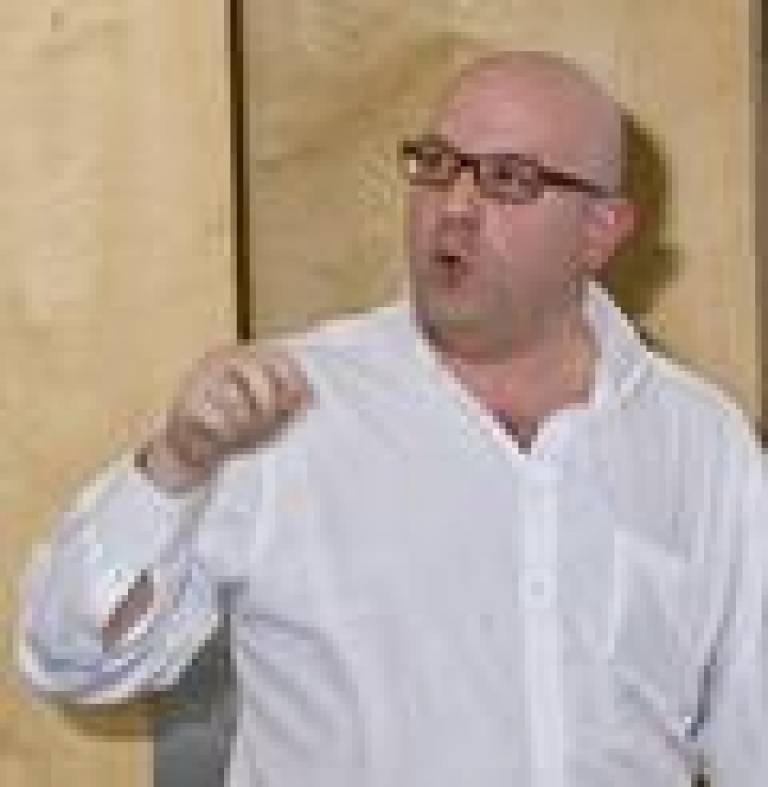Learning from Ovid: Humanities for Business lecture
6 May 2009
Link:
 ucl.ac.uk/drupal/site_news/sites/news/files/humanitiesforbusiness.mp3" target="_self">UCL news podcast: What businesses can learn from Ovid
ucl.ac.uk/drupal/site_news/sites/news/files/humanitiesforbusiness.mp3" target="_self">UCL news podcast: What businesses can learn from Ovid
Researchers in the arts and social sciences can play a tangible role in supporting business by applying insights gained from scholarship to help organisations evolve, according to Maurice Biriotti, UCL Visiting Professor of Humanities for Business.
In Professor Biriotti's experience, the ambiguity and flexibility of thought inherent to literature and philosophy can provide an original, human mode of understanding organisational issues, in contrast with the largely rigid dictates offered by many corporate change manuals. Unilever, the NHS, and DHL are among the corporations that have already drawn on contributions from arts and humanities academics to find new ways of approaching organisational problems.
Professor Biriotti was speaking in the context of his inaugural lecture as UCL Visiting Professor of Humanities for Business on 30 April. He is the Chief Executive of SHM Productions, a London-based strategy consultancy that investigates why people behave as they do - as leaders, colleagues, consumers or citizens - to help businesses decide directions that enhance performance.
A former academic, Professor Biriotti draws on authors including Zola, Kafka and Ovid (whose Metamorphoses he discussed in the lecture) to identify and reflect on the personal motivations that drive organisational success or failure.
"Much work done in the arts and humanities is perceived to be esoteric or rarefied, but society needs it, and to understand the power of it," Professor Biriotti said.
"As an academic I wanted to find ways of applying in the wider world the understanding of what makes people tick. Most big problems facing policymakers or businesses are human problems, arising from what is going on with people's motivations. It seemed to me that the humanities was one way to shed light on that.
"Reading literature allows you to accept ambivalence and to conceptualise it. Ovid's poetry, for example, allows you to think beyond the simplistic dichotomies that most business manuals proffer. Studying literature allows us to flex the muscle that lets us put ourselves in other people's place, enabling us to understand their motivations."
The lecture was introduced by Henry Woudhuysen, Exective Dean of the Faculty of the Arts and Humanities and Professor of English. It was well attended and received, with many in the audience expressing an interest in becoming involved in UCL's Humanities for Business programme.
To hear Professor Biriotti discuss his work bringing humanities to business problem-solving, follow the link at the top of this article.
Images: Professor Biriotti explains his passion for Ovid; audience members find out more about Professor Biriotti's method of supporting businesses
UCL context
The lecture was part of UCL's Humanities for Business programme, which seeks to foster an exchange of knowledge and perspectives between researchers from the arts and humanities, and businesses. One strand of this is a collaboration between the UCL Faculty of the Arts and Humanities and the adult education specialist City Lit. This project is designed to transfer knowledge in these fields to London's financial and business community.
This Humanities for Business 'knowledge transfer programme' aims to bring together UCL academics with senior managers in government and business to provide an alternative to more conventional forms of executive training or education, much of which is now seen to be of limited application in the challenging conditions of today's global economy. The growing recognition of the need for fundamental change has received added impetus by the downturn which the global economy now faces. It is increasingly acknowledged that the economic crisis of 2008-9 has been brought about by those who have paid little attention to the wider context of society.
As Professor Biriotti explained, the arts and humanities can address a broad range of complex issues faced by business today, including managing conflict, team dynamics, fostering leadership, intercultural cooperation, creativity and ethics.
To find out more about getting involved in the programme, please contact Berry Chevasco.
 Close
Close

